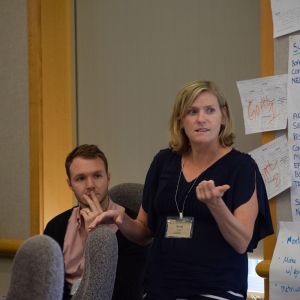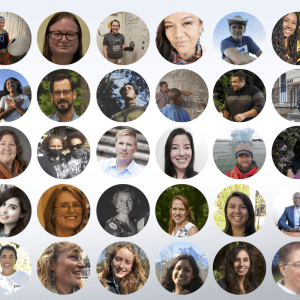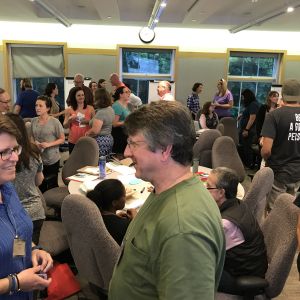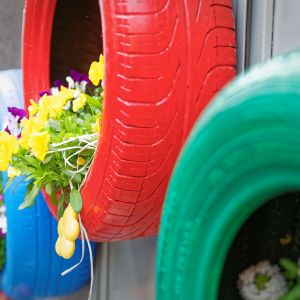
ee360 Goal 1: Driving Educator Excellence supports a diverse cadre of pre-service students, faculty, in-service educators, leaders, and trainers as environmentally literate and better prepared to be effective environmental educators.
Image

Diversity, Equity, & Inclusion Training
ee360 is committed to promoting diversity, equity, and inclusion. We are partnering with the Center for Diversity and the Environment (CDE) to provide training to help our network increase cultural competency and become more inclusive and relevant to the diverse communities in which we work.
The Center for Diversity and the Environment (CDE) is providing training to help environmental educators and leaders increase their cultural competency, and to assist their organizations in becoming more inclusive and relevant to the diverse communities in which they work. CDE is conducting training at introductory (short sessions) and more in-depth (half-day to full-day workshops) levels, including at the NAAEE Conference, ee360 national partner conferences, and train-the-trainer workshops. Additionally, CDE is working to help organizations develop a comprehensive organizational strategy for equity, diversity, and inclusion.
CDE’s work focuses on the dual challenge and opportunity society has to align the environmental movement with an increasingly multicultural and diverse society. The environmental movement is lagging behind in its efforts to match our country’s changing demographics, which has real and measurable economic, scholastic, and health impacts on communities of color, and takes a toll on U.S. society as a whole. It is CDE’s belief that bridging that gap will strengthen our communities and amplify the impact of the movement politically, culturally, and financially.
Partner: Center for Diversity and the Environment (CDE)
People: Queta González, Traci Price
Image
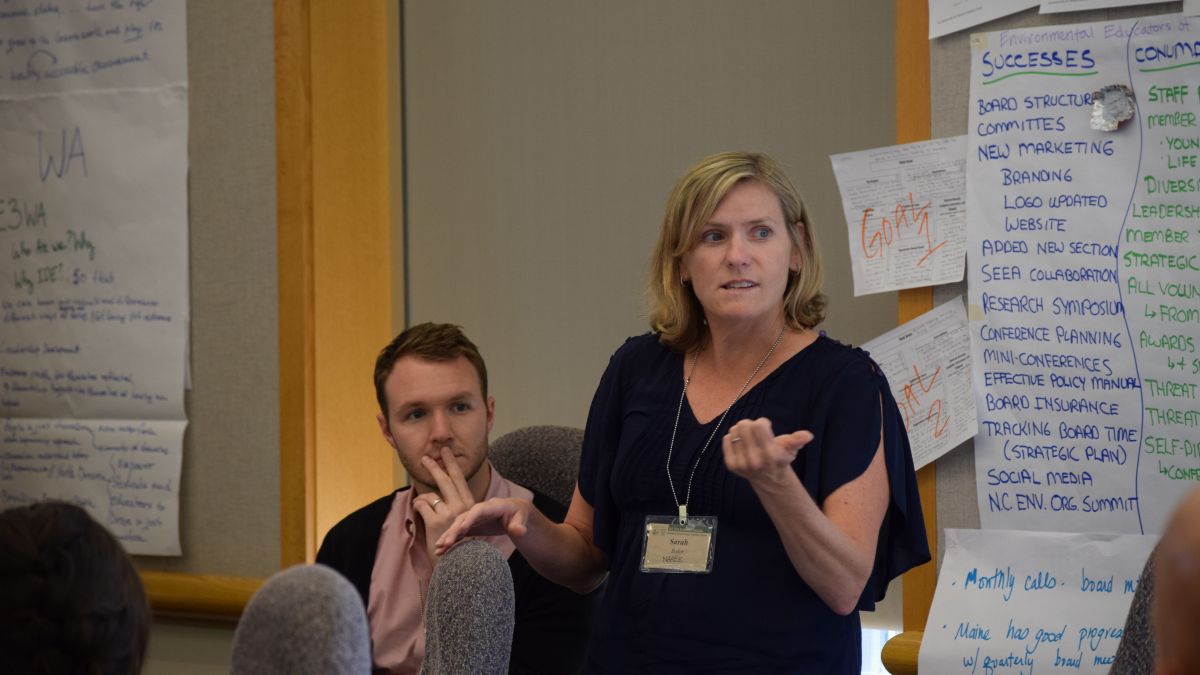
In-Service: Civic Engagement
Earth Force is identifying and training educators, trainers, and organizations in expanding their skills for understanding and addressing environmental issues, and personal and civic responsibility.
Earth Force is focusing on identifying and training educators, trainers, and organizations in Skills for Understanding & Addressing Environmental Issues, and Personal & Civic Responsibility, Strands 3 and 4, respectively, from Excellence in Environmental Education: Guidelines for Learning (K–12). Their civic engagement training program focuses on two models:
- A series of train-the-trainer events that target individuals representing organizations currently supporting EE in classrooms. As a result of participating in the train-the-trainer program, representatives will be prepared to integrate civic engagement skills training into their existing environmental education programs.
- Direct engagement with in-service educators. These educators will develop the skills and knowledge to incorporate environmental investigations as the means to meet standards-based requirements.
Earth Force is committed to working with underserved communities across the country, targeting cities with large underserved populations, and within those cities, focusing on areas that have been particularly hard hit by environmental challenges.
Partner: EarthForce
People: Vince Meldrum
Image

In-Service: Professional Development & Leadership
Leadership training to support state/regional infrastructure, in-service training for formal educators, and outreach to diverse audiences
Project Learning Tree (PLT) is increasing the delivery of environmental education training and long-term support to educators across the U.S. Their work enables educators to teach effectively about environmental issues and to use EE as a tool for improving teaching and learning and achieving a healthy and sustainable environment. PLT’s trainings focus on three specific areas: leadership training to support state/regional infrastructure; in-service training for formal educators that builds on existing quality EE programs; and engagement with diverse audiences (both primary and secondary).
Partner: Project Learning Tree (PLT)
People: Esther Cowles
Image

CEE-Change Fellowship
NAAEE convenes a group of community leaders to address environmental issues at the local level, equipping them with the skills to communicate, network, mentor, and share best practices to stimulate local community resiliency efforts in their communities.
The CEE-Change Fellowship, which supports leadership and innovation in civics and environmental education around the world, began in early July of 2021 with 30 Fellows. NAAEE recognizes the value in fostering leadership within schools and at the community level, promoting civic engagement and environmental responsibility, and ultimately building more resilient and healthy communities. The fellowship program is a partnership with U.S. EPA and the Cedar Tree Foundation to help strengthen environmental education and civic engagement.
Partners: Cedar Tree Foundation, United States Environmental Protection Agency (EPA), NAAEE
People: Nina Hamilton
Image
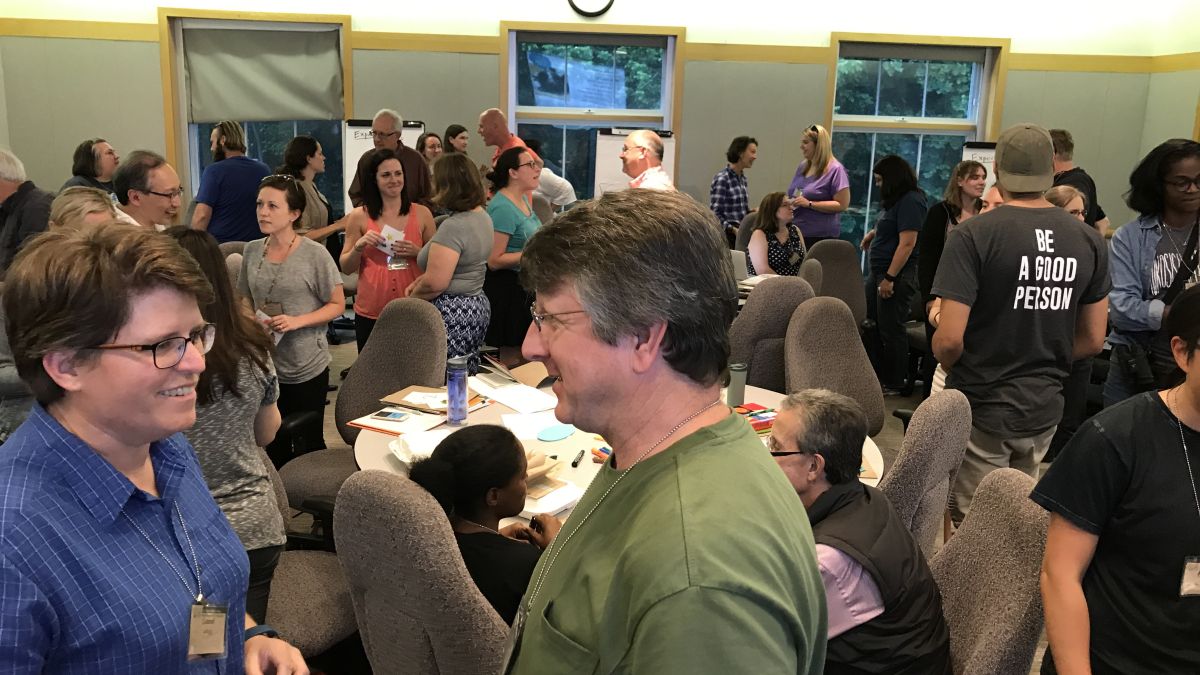
Preservice Training
Project Learning Tree is working with its networks of EE leaders to collaborate and deliver training to preservice faculty from across the U.S., using successful methods for integrating EE into preservice methods courses.
Project Learning Tree (PLT) is delivering environmental education training and ongoing support to preservice faculty across the United States to enable them to embed environmental education effectively into their preservice methods courses, including using their newly revised Preservice Faculty Member Handbook to better equip faculty members. They hope to improve teaching and learning about working toward a healthy and sustainable environment.
PLT is working with its networks of EE leaders to collaborate and deliver training to preservice faculty, using successful methods for integrating EE into preservice methods courses identified through the previous EETAP (Environmental Education Training and Partnership) agreements funded by U.S. EPA. Priority for training will be given to state programs working with Historically Black Colleges and Universities, Hispanic Serving Institutions, or Tribal Colleges/Universities.
Partner: Project Learning Tree (PLT)
People: Esther Cowles
Image

Guidelines Training
The University of Oregon and Antioch University of New England are conducting a number of training workshops on the Guidelines for Excellence, including the Community Engagement guidelines, the newest publication in the series.
The National Project for Excellence in Environmental Education (NPEEE) was initiated by NAAEE in 1994. Since that time, NAAEE has published the Guidelines for Excellence, a series of six documents that help educators create quality environmental education resources and programs. These publications are foundational to the professionalization of the field of environmental education. They impact environmental education by improving the preparation and professional development of environmental educators, increasing the quality of instructional materials, providing developmentally appropriate benchmarks for environmental literacy, and encouraging the integration of environmental education into early childhood learning.
Partners: Antioch University-New England, NAAEE, University of Oregon
People: Jean Kayira, Libby McCann, Bora Simmons

